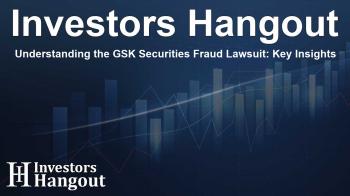Understanding the GSK Securities Fraud Lawsuit: Key Insights

Key Information About GSK Securities Fraud Lawsuit
The GSK plc (NYSE: GSK) securities fraud lawsuit has captured the attention of investors following significant allegations surrounding the company. This case, which revolves around American Depositary Receipts (ADRs), brings forth crucial details that potential investors and affected parties should be aware of.
Understanding the Class Period
The lawsuit is directed towards individuals who purchased GSK ADRs during the specified class period. This timeframe, which spans from February 5, 2020, to August 14, 2022, marks significant events that could impact the value and reputation of GSK. Key to this is the notion that those who participated in this period might seek compensation if they were misled about the true state of affairs regarding the company’s product, Zantac.
What Investors Need to Know
If you bought GSK ADRs during the mentioned timeframe, you might be eligible for compensation. Remarkably, this can occur under a contingency fee arrangement, meaning you do not need to pay out of pocket. There is a critical deadline to consider with the lead plaintiff application due, urging individuals to act promptly if they wish to be at the forefront of this case.
Allegations Against GSK
At the heart of the lawsuit lies the allegation that GSK misled investors on multiple fronts concerning the withdrawal of Zantac from the market. According to the complaint, GSK continually reassured shareholders that the decision to remove the product was grounded in regulatory communications and available information.
False Representations?
Despite these assurances, it has been claimed that GSK was aware of significant health risks associated with Zantac, specifically the presence of NDMA, a known carcinogen. This knowledge reportedly existed long before any official withdrawal, suggesting that statements made to investors were not only misleading but potentially harmful to their financial interests.
Why Choose Experienced Counsel
Selecting the right legal representation is paramount in cases like this. Many firms proclaim readiness to support investors but lack the adequate resources or recognition necessary to lead effectively. It’s advised that investors seek counsel with a proven track record in securities litigation, ensuring a higher chance of achieving favorable outcomes.
The Importance of Transparency
Investors deserve transparency regarding the companies they trust with their capital. The complaint alleges a culture of concealment at GSK, urging potential class members to consider their rights seriously. Those who believe they have a stake in this case can reach out for more information about joining the class action. However, it's critical to recognize that a certified class does not currently exist, meaning individual counsel must be retained to represent personal interests.
Join the Class Action
For those wishing to join the GSK action, there are specific steps to consider. Engaging with the appropriate legal pathways will enable affected investors to stand together against misleading corporate practices. Understanding your position and the legal landscape can significantly enhance your opportunity for recovery.
Conclusion: Take Action
As developments unfold regarding GSK’s position and the progress of the lawsuit, it's essential for potential investors and current shareholders to stay informed. Engaging with legal counsel and exploring participation in the class action could yield important benefits, furthering the cause for investor rights and corporate responsibility.
Frequently Asked Questions
What is the GSK securities fraud lawsuit about?
The lawsuit involves allegations that GSK misled investors about the safety of Zantac and its market withdrawal linked to cancer risks.
How do I know if I am eligible for the class action?
Investors who purchased GSK ADRs during the class period should review their investments and seek legal advice to determine eligibility.
What should I do if I want to join the class action?
It's advisable to contact qualified legal counsel who can guide you through the process of joining the class action.
What are contingency fee arrangements?
This arrangement allows clients to pursue legal claims without upfront costs, as fees are only paid from any awarded compensation.
Are there any risks in joining the class action?
While there are potential benefits, risks may include the uncertainty of outcomes and the timeline of legal proceedings. Consulting with an attorney can help clarify these factors.
About The Author
Contact Owen Jenkins privately here. Or send an email with ATTN: Owen Jenkins as the subject to contact@investorshangout.com.
About Investors Hangout
Investors Hangout is a leading online stock forum for financial discussion and learning, offering a wide range of free tools and resources. It draws in traders of all levels, who exchange market knowledge, investigate trading tactics, and keep an eye on industry developments in real time. Featuring financial articles, stock message boards, quotes, charts, company profiles, and live news updates. Through cooperative learning and a wealth of informational resources, it helps users from novices creating their first portfolios to experts honing their techniques. Join Investors Hangout today: https://investorshangout.com/
The content of this article is based on factual, publicly available information and does not represent legal, financial, or investment advice. Investors Hangout does not offer financial advice, and the author is not a licensed financial advisor. Consult a qualified advisor before making any financial or investment decisions based on this article. This article should not be considered advice to purchase, sell, or hold any securities or other investments. If any of the material provided here is inaccurate, please contact us for corrections.

